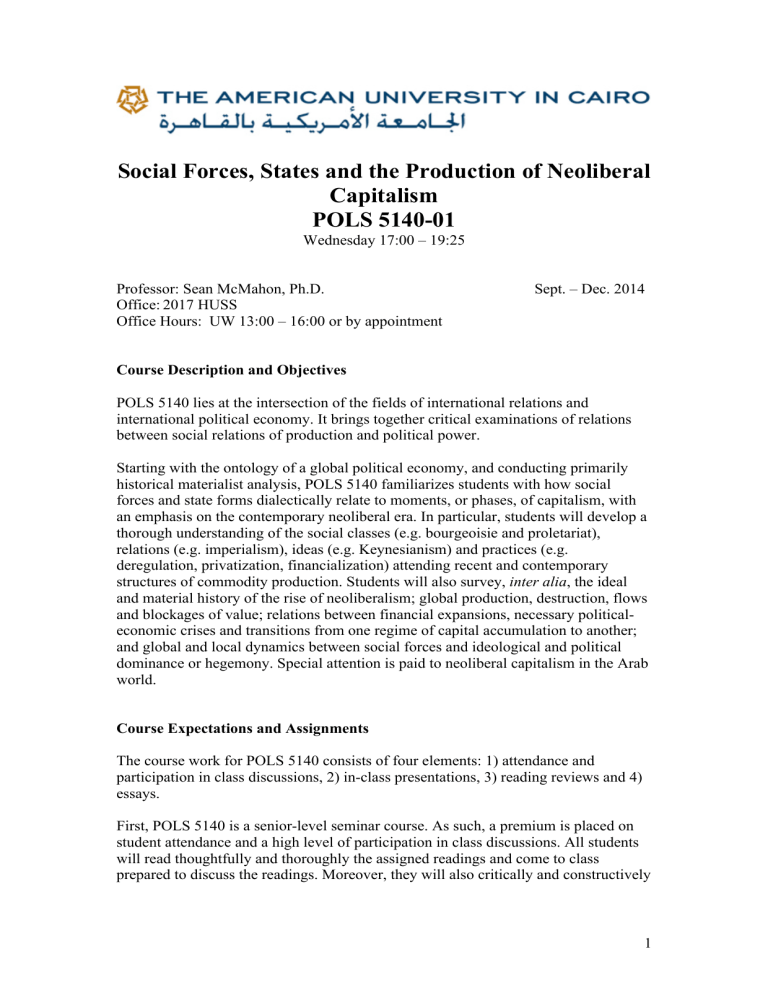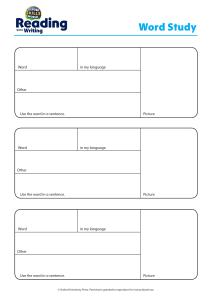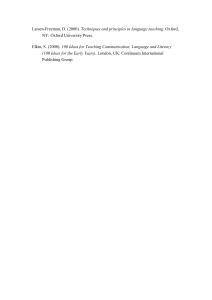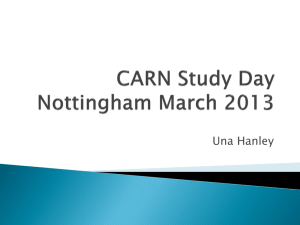
Social Forces, States and the Production of Neoliberal Capitalism POLS 5140-01 Wednesday 17:00 – 19:25 Professor: Sean McMahon, Ph.D. Office: 2017 HUSS Office Hours: UW 13:00 – 16:00 or by appointment Sept. – Dec. 2014 Course Description and Objectives POLS 5140 lies at the intersection of the fields of international relations and international political economy. It brings together critical examinations of relations between social relations of production and political power. Starting with the ontology of a global political economy, and conducting primarily historical materialist analysis, POLS 5140 familiarizes students with how social forces and state forms dialectically relate to moments, or phases, of capitalism, with an emphasis on the contemporary neoliberal era. In particular, students will develop a thorough understanding of the social classes (e.g. bourgeoisie and proletariat), relations (e.g. imperialism), ideas (e.g. Keynesianism) and practices (e.g. deregulation, privatization, financialization) attending recent and contemporary structures of commodity production. Students will also survey, inter alia, the ideal and material history of the rise of neoliberalism; global production, destruction, flows and blockages of value; relations between financial expansions, necessary politicaleconomic crises and transitions from one regime of capital accumulation to another; and global and local dynamics between social forces and ideological and political dominance or hegemony. Special attention is paid to neoliberal capitalism in the Arab world. Course Expectations and Assignments The course work for POLS 5140 consists of four elements: 1) attendance and participation in class discussions, 2) in-class presentations, 3) reading reviews and 4) essays. First, POLS 5140 is a senior-level seminar course. As such, a premium is placed on student attendance and a high level of participation in class discussions. All students will read thoughtfully and thoroughly the assigned readings and come to class prepared to discuss the readings. Moreover, they will also critically and constructively 1 engage the works of their peers. Attending class, without participating or engaging peers, is not sufficient and will produce an extremely poor grade. University policy stipulates that a student who misses more than the equivalent of three weeks of class meetings during a semester for any reason may be assigned a reduced grade for the course — including the grade of “F” — solely on the basis of inadequate attendance, regardless of excuse. Students who miss fewer than three weeks of class sessions may not be penalized on the grounds of attendance alone. Students are personally responsible for making up any academic tasks and assignments missed due to their absence. This seminar is rooted in constructivist learning. Students will be the meaning makers and constructors of knowledge in this environment. They will make meaning and construct knowledge through extensive collaboration and peer-teaching and learning. This means that students should expect the professor to only occasionally weigh into discussion. Second, in addition to regular class participation, students will make two presentations on all of the day’s assigned readings over the course of the term. These presentations are to be of a critical nature. Do not write descriptive summaries – you can assume the professor and other students have read the material and do not require a synopsis. The presentations are critical commentaries designed to 1) highlight salient aspects of the readings, 2) make inter-textual connections between the day’s texts as well as with other material encountered in the course, 3) reference and/or illuminate recent events, and 4) raise provocative questions for class discussion. Special attention should be paid to how the assigned material speaks to contemporary issues of classes and social forces, forms of state and the global political economy; the linkages between production and power. The presentations should be approximately 10-15 minutes in length and the questions will serve to guide the day’s engagement with the readings. Students must submit a written copy, typed and properly formatted, of their presentation to the professor on the day of presentation. Third, students will submit five reading reviews over the course of the semester. Each review will identify the author and title of the week’s reading as well as outline the theses, argumentation, analyses and/or conclusions of the texts. Ideally, students will relate the texts to other readings encountered throughout the course and/or in the larger discourses of International Relations and Political Economy. Each review is not to exceed two pages in length and is due before the start of the class when the selected readings are discussed. Students cannot submit reviews of readings on which they make presentations; presenting on a set of readings precludes a student from submitting a review of those same readings. Fourth, students will write three essays for POLS 5140. Each essay will apply the conceptual tools and/or analyses encountered in different phases of the course, say for example an ontology of production, or the historical relation between the empowerment of industrial working classes in the imperial core, the emergence of the liberal welfare state and global realization of value from the first phase, to analyse an aspect of our complex historical moment. The essays are opportunities for students to think critically and more deeply about contemporary issues of interest and import to them. Students are encouraged to discuss their topics with the professor prior to 2 writing and submitting the essays. Each essay, worth 15 per cent of the final grade, is to be 8-10 pages in length (double-spaced with proper 12 point font and margins). The first essay, using concepts and/or analyses explored between 17 September and 8 October, is due 8 October 2014. The second essay, using concepts and/or analyses explored between 15 October and 5 November, is due 5 November 2014. The third essay, using concept/analyses explored between 12 November and 3 December, is due 3 December 2014. In all of the written work for this course, students must use footnotes and provide a proper bibliography (in-text citations and “Works Cited” pages are not acceptable) in order to acknowledge their intellectual indebtedness. Use of the Chicago Manual of Style is mandatory. Consult the following link for a proper citation guide: www.chicagomanualofstyle.org. You will be penalized if you do not follow this format. Finally, research conducted and used for POLS 5140 must be of an academic nature. Wikipedia, for example, is not an acceptable resource. Its content is not evaluated according to academic standards. If a student is in doubt as to the quality or academic relevancy of a particular resource, (s)he should discuss it with the professor. Grades, Assessment and Interaction Course grades will be assigned as follows: 1) Attendance and Participation 20% 2) Presentations (2 X 10%) 20% 3) Reading Reviews (5 X 3%) 15% 4) Essays (3 X 15%) 45% The following scale will be employed in the assessment of undergraduate student work: Letter Grade A AB+ B B- Percentage 93+ 90-92 87-89 83-86 80-82 Letter Grade C+ C CD+ D F Percentage 77-79 73-76 70-72 67-69 60-66 Below 60 Assignments are submitted only in hardcopy and are due during class time. Assignments submitted on the due date, but after class time are late. The penalty for late assignments is five per cent per day (including weekends). The American University in Cairo is committed to the highest standards of academic integrity and honestly. Academic dishonesty in any form will not be tolerated and, in 3 accordance with departmental policy, will result in the immediate assignment of a grade of “F” for the course. Students are expected to be familiar with the standards regarding academic honesty and to uphold the policies of the university in this respect. Students are particularly urged to familiarize themselves with their rights and responsibilities and avoid any behavior which could potentially result in suspicions of cheating, plagiarism, misrepresentation of facts and/or participation in an offense. Academic dishonesty is a serious offence and will be treated as such. Two final points: POLS 5140 is supported by a Moodle site. It can be accessed through the following URL: http://moodle.acuegypt.edu. Also, the professor does not use email. Email undermines the professor-student relationship, is heavily surveilled by state apparatuses, atomizes communities and decreases productivity. All class related conversations will be had during the assigned office hours, which are extensive, or by appointment. Exceptions will be made only in case of emergency (smcmahon@aucegypt.edu). Required Texts There are two required texts for this course: Cox, Robert. Production, Power and World Order: Social Forces in the Making of History (New York: Columbia University Press, 1987). Harvey, David. A Brief History of Neoliberalism (Oxford: Oxford University Press, 2007). In addition to doing the assigned readings, students are encouraged to regularly consult critical publications such as Millennium: Journal of International Studies, Monthly Review, New Left Review and the Review of Radical Political Economics, as well as the World Socialist Web Site (www.wsws.org), Counterpunch (www.counterpunch.org) and the Socialist Worker website (www.socialistworker.org). Schedule of Readings (note: this is a guideline and subject to change) Date Topic Readings and Course Material Sept. 10 Welcome Course overview and sign-up for presentations Sept. 17 Social Relations of Production Cox, R. “Preface.” In Production, Power and World Order: Social Forces in the Making of History, ix-xii. New York: Columbia University Press, 1987). 4 Cox, R. “Theme.” In Production, Power and World Order: Social Forces in the Making of History, 1-. New York: Columbia University Press, 1987). Cox, R. “Part 1: The Social Relations of Production.” In Production, Power and World Order: Social Forces in the Making of History, 17-109. New York: Columbia University Press, 1987). Sept. 24 States, World Orders, and Production Relations Cox, R. “Part 2: States, World Orders, and Production Relations.” In Production, Power and World Order: Social Forces in the Making of History, 111-267. New York: Columbia University Press, 1987). Oct. 1 Crises, Classes and Structures of Accumulation Cox, R. “Part 3: Production Relations in the Making of the Future.” In Production, Power and World Order: Social Forces in the Making of History, 273-403. New York: Columbia University Press, 1987). Oct. 8 Financial Expansion and Crisis Arrighi, G. “The Long Twentieth Century.” In The Long Twentieth Century: Money, Power, and the Origins of Our Times, pp. 239-324. London: Verso Books, 1994. Oct. 15 Historicizing Neoliberalism I Harvey, D. “Introduction.” In A Brief History of Neoliberalism, pp. 1-4. Oxford: Oxford University Press, 2007 Harvey, D. “Freedom’s Just Another Word...” In A Brief History of Neoliberalism, pp. 5-38. Oxford: Oxford University Press, 2007. Harvey, D. “The Construction of Consent.” In A Brief History of Neoliberalism, pp. 39-63. Oxford: Oxford University Press, 2007. Harvey, D. “The Neoliberal State.” In A Brief History of Neoliberalism, pp. 64-86. Oxford: Oxford University Press, 2007 5 Harvey, D. “Uneven Geographical Developments.” In A Brief History of Neoliberalism, pp. 87-119. Oxford: Oxford University Press, 2007. Oct. 22 Historicizing Neoliberalism II Harvey, D. “Neoliberalism ‘with Chinese Characteristics’.” In A Brief History of Neoliberalism, pp. 120-151. Oxford: Oxford University Press, 2007. Harvey, D. “Neoliberalism on Trial.” In A Brief History of Neoliberalism, pp. 152-182. Oxford: Oxford University Press, 2007. Harvey, D. “Freedom’s Prospect.” In A Brief History of Neoliberalism, pp. 183-206. Oxford: Oxford University Press, 2007 Oct. 29 Disciplinary Neoliberalism and Empire Strange, S. “Towards a Theory of Transnational Empire.” In Authority and Markets: Susan Strange’s Writings on International Political Economy, edited by Roger Tooze and Christopher May, 141-156. New York: Palgrave, 2002. Strange, Susan. “Political Economy and International Relations.” In International Relations Theory Today, eds. Ken Booth and Steve Smith, 154174. University Park , Pennsylvania: The Pennsylvania State University Press, 1995. Gill, Stephen. “Historical Materialism, Gramsci and International Political Economy.” In The New International Political Economy, ed. by Craig Murphy and Roger Tooze. Boulder: Lynne Rienner, 1991. Gill, Stephen. “Globalisation, Market Civilization and Disciplinary Neoliberalism.” Millennium: Journal of International Studies 24 (Dec. 1995): 399-423. 6 Nov. 5 Neoliberalization of Education, Democracy and Sovereignty Giroux, H. “The New Right-Wing Assault on Higher Education.” In The University in Chains: Confronting the Military-Industrial-Academic Complex, 137-199. Boulder, CO: Paradigm Publishers, 2007. Brown, W. “Neoliberalism and the End of Liberal Democracy.” In Edgework: Critical Essays on Knowledge and Politics, 37-59. Princeton: Princeton University Press, 2005. Ong, A. “Powers of Sovereignty: State, people, wealth, life.” Focaal – Journal of Global and Historical Anthropology 64 (2012): 24-35. Nov. 12 Maybe it was something capitalism ate… Panitch, L. and S. Gindin. “Capitalist Crises and the Crisis this Time.” In The Crisis This Time: Socialist Register 2011, edited by Leo Panitch, Greg Albo and Vivek Chibber, 1-20. Pontypool: Merlin Press, 2011. Huws, U. “Crisis as capitalist opportunity: new accumulation through public service commodification.” In The Crisis and the Left: Socialist Register 2012, edited by by Leo Panitch, Greg Albo and Vivek Chibber, 64-84. Pontypool: Merlin Press, 2012. Soederberg, S. “Cannibalistic Capitalism: The Paradoxes of Neoliberal Pension Securitization.” In The Crisis This Time: Socialist Register 2011, edited by Leo Panitch, Greg Albo and Vivek Chibber, 224241. Pontypool: Merlin Press, 2011. Nov. 19 Alternatives to, and Local Iterations of, Global Capitalist Crisis Albo, G. “The crisis and economic alternatives.” In The Question of Strategy: Socialist Register 2013, by Leo Panitch, Greg Albo and Vivek Chibber, 1-25. Pontypool: Merlin Press, 2013. Hung, H. “China: Saviour or 7 Challenger of the Dollar Hegemony.” Development and Change 6 (2013): 1341-1361. van Apeldoorn, B. “The European capitalist class and the crisis of its hegemonic project. “ In Registering Class: Socialist Register 2014, edited by Leo Panitch, Greg Albo and Vivek Chibber, 189-206. Pontypool: Merlin Press, 2014. Nov. 26 Neoliberalism, Colonization and Forms of State Hever, S. “Beyond Exploitation.” In The Political Economy of Israel’s Occupation: Repression Beyond Exploitation, Shir Hever, 139-187. New York: Pluto Press, 2010. Hanieh, A. “Class and State in the West Bank: Neoliberalism under Occupation.” In Lineages of Revolt: Issues of Contemporary Capitalism in the Middle East, Adam Hanieh, 99122. Chicago: Haymarket Books, 2013. McMahon, S. “Internationalizing the Egyptian State: Market Fundamentalists and the Military.” Working paper. Dec. 3 Is the “Arab Spring” Capitalism’s Autumn? McMahon, S. “Egypt’s Social Forces, the State and the Middle East Order.” In Egypt’s Tahrir Revolution, edited by Dan Tschirgi, Walid Kazziha and Sean F. McMahon, 151-172. Boulder, CO: Lynne Rienner Press, 2013. Hanieh, A. “Mapping the Neoliberal Experience.” In Lineages of Revolt: Issues of Contemporary Capitalism in the Middle East, Adam Hanieh, 47-74. Chicago: Haymarket Books, 2013. Amin, S. “An Arab Springtime?” In The People’s Spring: The Future of the Arab Revolution, Samir Amin, 16-40. Fahamu: Pambazuka Press, 2012. 8 Dec. 10 Course Review What is to be done, ideally and materially? *This semester there is one “make-up” class for Wednesday courses. In lieu of a Saturday on-campus class, students will watch Dr. David Harvey’s lecture entitled “The 17 Contradictions of Capitalism” (available at: https://www.youtube.com/watch?v=AULJlwoI3TI) for the week of 15 October. 9



